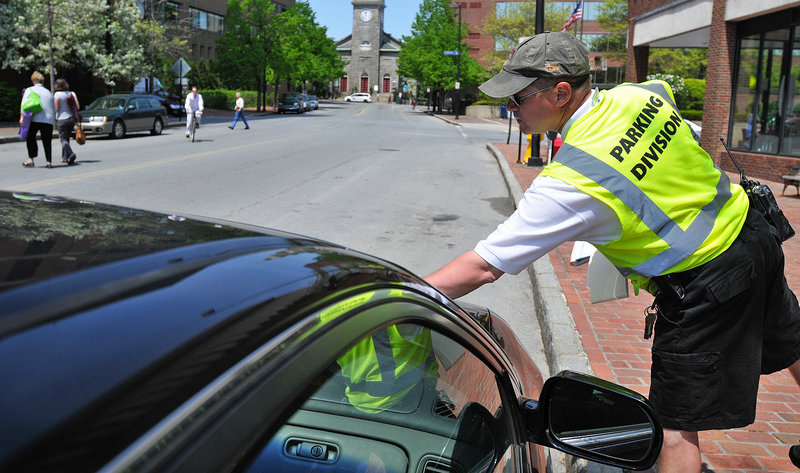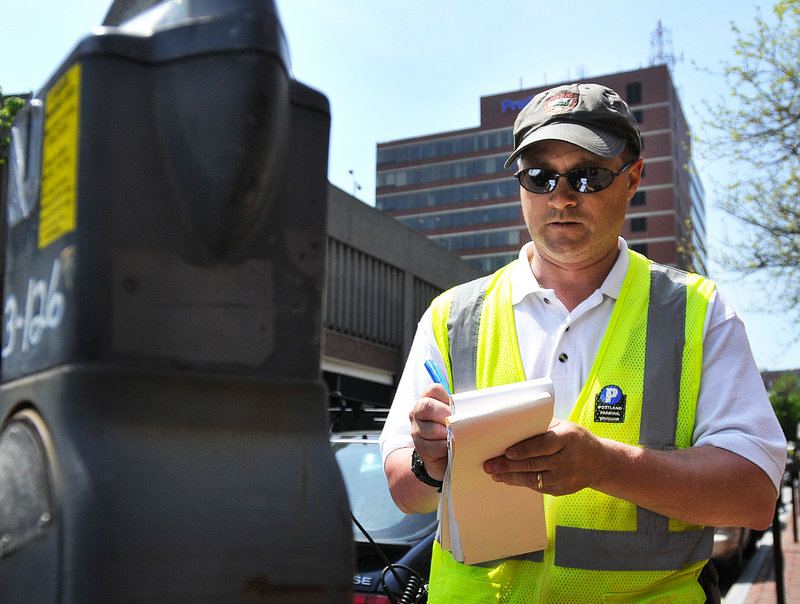PORTLAND — The city’s decision to end its parking ticket forgiveness program last year has been a boost to its bottom line.
But it’s dinged the budget of Portlander Derek Guruimond, who headed to City Hall last week to pay $40 worth of tickets.
Guruimond said he liked the program, which allowed tickets for overtime parking or an expired meter to lapse after six months as long as the car wasn’t ticketed again.
“Living downtown, it was nice to have that kind of leeway once in a while,” said Guruimond, who was paying $15 for an expired meter ticket, which would have been eligible for forgiveness, and another $25 for parking on the wrong side of the street, which wouldn’t have been.
The city’s mercy rule fell victim to the budget last year after the City Council could no longer justify waiving a total of $500,000 in parking fines. The city took in $1,325,000 in parking fines in 2009-10 and is on track to take in $1,835,000 this year, slightly more than expected, said Nicole Clegg, a spokeswoman for Portland.
The city said it hasn’t determined which fines might have been forgiven under the old rule, but the parking ticket revenue has been fairly steady since the era of forgiveness began in 1994, suggesting that most of the increase is due to tickets that would have been waived a year ago.
Businesses liked the forgiveness program, figuring customers – particularly tourists – might get upset to find a slip underneath the windshield wiper after patronizing a downtown store, possibly so irked they might not return.
“We certainly hated to see it leave,” said Janis Beitzer, executive director of Portland’s Downtown District.
Beitzer said she fielded a lot of calls last spring from people opposed to the change when the council was considering whether to end the forgiveness program. Some were from businesses, she said, and many were from residents of other parts of Maine who occasionally visited downtown Portland and, occasionally, overstayed their welcome at one of the city’s 1,450 or so meters.
Beitzer said it would be hard to argue for the program to return because, while the city can quantify how much more it is taking in on fines, no one can gauge how many people are upset at getting a ticket.
“There’s no way to rate the goodwill factor,” she said.
One unexpected fan of forgiveness is John Peverada, the director of Portland’s parking division.
“I’ll be honest with you, I liked the program,” he said. “It was a friendly program and it showed that we’re not really out there to write a ticket, it’s to promote parking turnover.”
Peverada has saved a short article from The Washington Post in 2004 in which a columnist noted that a colleague had gotten a ticket while in Portland.
“It was possibly the kindest, the gentlest – the downright nicest – parking ticket he’d ever received,” columnist John Kelly wrote. After describing the forgiveness program, Kelly quoted Peverada as saying it was a friendly program and the city made up in goodwill what it lost in revenue.
“Can you imagine such a thing in the Washington area? Friendly parking enforcement?” the column concluded.
Peverada said Portland’s program was a rarity. In his research, he’s found only a handful of towns or cities that do the same thing, and the list is not likely to grow.
Peverada, who just came back from the International Parking Institute’s annual conference in Pittsburgh, Pa., said that when someone raised the idea of instituting a ticket forgiveness program, the audience guffawed. But then Peverada stood up to explain Portland’s program and report that it was good while it lasted.
Beitzer said her organization reminds visitors that they can still use the city’s park-and-shop program, with many stores validating parking garage tickets for up to two hours of free parking.
And both she and Peverada are hoping the city’s new pay station parking program, coming this fall, will make it easier for residents and visitors to park on the street and avoid a ticket.
The city is putting about $200,000 into a pilot program to remove the meters from some downtown streets and install pay stations, which will accept cash and credit cards and dispense a time-stamped receipt for drivers to put on their dashboard.
City officials expect the system to create more parking spaces because people will no longer be bound by the spaces defined by the placement of the meters. But there won’t be any way to avoid a ticket for overstaying the time stamped on the receipt.
Staff Writer Edward D. Murphy can be contacted at 791-6465 or at: emurphy@pressherald.com
Send questions/comments to the editors.





Success. Please wait for the page to reload. If the page does not reload within 5 seconds, please refresh the page.
Enter your email and password to access comments.
Hi, to comment on stories you must . This profile is in addition to your subscription and website login.
Already have a commenting profile? .
Invalid username/password.
Please check your email to confirm and complete your registration.
Only subscribers are eligible to post comments. Please subscribe or login first for digital access. Here’s why.
Use the form below to reset your password. When you've submitted your account email, we will send an email with a reset code.